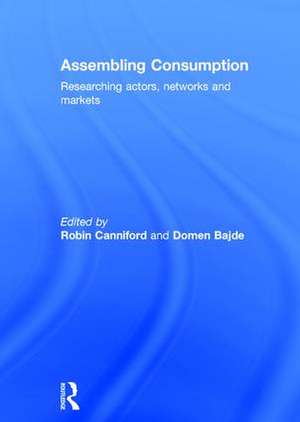Assembling Consumption: Researching actors, networks and markets
Editat de Robin Canniford, Domen Bajdeen Limba Engleză Hardback – 21 sep 2015
Clear theoretical explanation and methodological innovation, alongside empirical applications of these emerging frameworks will offer readers new and refreshing perspectives on consumer culture and market societies. This is an essential reading for both seasoned scholars and advanced students of markets, economies and social forms of consumption.
Preț: 765.84 lei
Preț vechi: 1028.38 lei
-26% Nou
Puncte Express: 1149
Preț estimativ în valută:
146.56€ • 152.45$ • 120.100£
146.56€ • 152.45$ • 120.100£
Carte tipărită la comandă
Livrare economică 14-28 aprilie
Preluare comenzi: 021 569.72.76
Specificații
ISBN-13: 9781138820937
ISBN-10: 1138820938
Pagini: 214
Ilustrații: 2 black & white illustrations, 4 black & white tables, 1 black & white halftones, 1 black & white line drawings
Dimensiuni: 174 x 246 x 18 mm
Greutate: 0.54 kg
Ediția:1
Editura: Taylor & Francis
Colecția Routledge
Locul publicării:Oxford, United Kingdom
ISBN-10: 1138820938
Pagini: 214
Ilustrații: 2 black & white illustrations, 4 black & white tables, 1 black & white halftones, 1 black & white line drawings
Dimensiuni: 174 x 246 x 18 mm
Greutate: 0.54 kg
Ediția:1
Editura: Taylor & Francis
Colecția Routledge
Locul publicării:Oxford, United Kingdom
Public țintă
Postgraduate and UndergraduateCuprins
1. Assembling Consumption, Robin Canniford and Domen Bajde Part 1: Heterogeneity and Relationality 2. From Counterculture Movement to Mainstream Market: Emergence of the U.S. Organic Food Industry, John W. Schouten, Diane M. Martin, Hedon Blakaj & Andrei Botez 3. Assembling Markets and Value, Zeynep Arsel 4. The Concept of the Assemblage and the Case of Markets, Jon Roffe Part 2: Consumed by Hybrids 5. The Heterogeneous and Open-ended Project of Assembling Family, Linda L. Price & Amber Epp 6. Home in Mobility: An exercise in Assemblage thinking, Bernardo Figueiredo 7. OOO: oooh!, Norah Campbell & Gerard McHugh Part 3: Consumers within Networks 8. Empathetic Engagements and Authentic Detachments: On horses, leaders and interspecies becomings, Aja Smith 9. The Digital Doppelgänger Within: A study on self-tracking and the quantified self movement, Matthias Bode & Dorthe Brogård Kristensen 10. Post-dualistic Method: Mining for new research questions, Robin Canniford & Avi Shankar Part 4: Intervening in Assemblages 11. Mood-Management in the English Premier League, Tim Hill 12. Triggers, Tensions, and Trajectories: Toward an understanding of the dynamics of consumer enrolment in uneasily intersecting assemblages, Daiane Scaraboto & Eileen Fischer 13. A Commentary: Where (and what) is the critical in consumer-oriented Actor-network theory?, Shona Bettany
Notă biografică
Robin Canniford is Co-director of the Cluster for the study of Organisation, Society and Markets (COSM) at the University of Melbourne, Australia. His research applies ethnographic methods to trace the market-mediated intersections of discursive environments and consumer subjectivity. He is particularly interested in the intersections of ‘nature’ and markets. His work has appeared in Marketing Theory, the Journal of Consumer Research and the European Journal of Marketing.
Domen Bajde is Associate Professor at the University of Southern Denmark. His research explores the intersection of pro-social action and markets, giving and charitable behaviour and online consumer behaviour. His recent research combines different socio-cultural perspectives to explore the ideological and socio-material aspects of practices occurring at the intersection of gift and market. His work has been published in Consumption, Markets and Culture, Marketing Theory and Behaviour and Information Technology.
Domen Bajde is Associate Professor at the University of Southern Denmark. His research explores the intersection of pro-social action and markets, giving and charitable behaviour and online consumer behaviour. His recent research combines different socio-cultural perspectives to explore the ideological and socio-material aspects of practices occurring at the intersection of gift and market. His work has been published in Consumption, Markets and Culture, Marketing Theory and Behaviour and Information Technology.
Recenzii
"Assembling Consumption is the definitive guide to understanding how the assemblage concept can bring new insights to understandings of consumer culture. Canniford and Badje gather leading scholars working in this area to demonstrate methodological and empirical applications of these emerging theories. If you are considering using an assemblage approach, or simply want to remain on the cutting edge of consumer-culture research techniques, this volume is a must-read." —Giana Eckhardt, Professor, Royal Holloway, University of London
"Researchers, assemble yourselves! In this handy, useful guide, you (and you!) will find assemblage and actor-network theories composed such that their edifying value can be assessed, not tamed. Assembling Consumption affords the novice transformational entrée through impassioned texts that invite a re-doing and re-expression of the territories occupied by "consumer" and "market(ing)" in an epoch of heterogeneous, emergent networks, compression and instantaneity." —Eric Arnould, Professor, University of Southern Denmark
"Researchers, assemble yourselves! In this handy, useful guide, you (and you!) will find assemblage and actor-network theories composed such that their edifying value can be assessed, not tamed. Assembling Consumption affords the novice transformational entrée through impassioned texts that invite a re-doing and re-expression of the territories occupied by "consumer" and "market(ing)" in an epoch of heterogeneous, emergent networks, compression and instantaneity." —Eric Arnould, Professor, University of Southern Denmark
Descriere
Assembling Consumption marks a definitive step in the institutionalisation of qualitative business research. By gathering leading scholars and educators who study markets, marketing and consumption through the lenses of philosophy, sociology and anthropology, this book clarifies and applies the investigative tools offered by assemblage theory, actor-network theory and non-representational theory.
